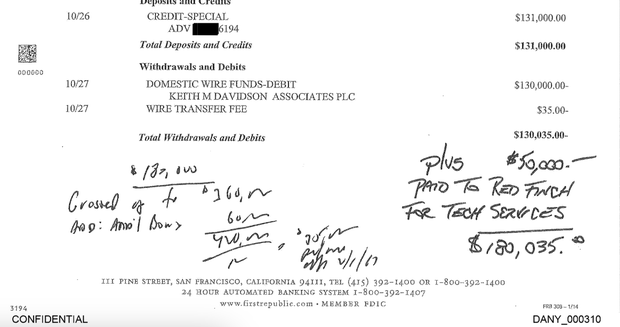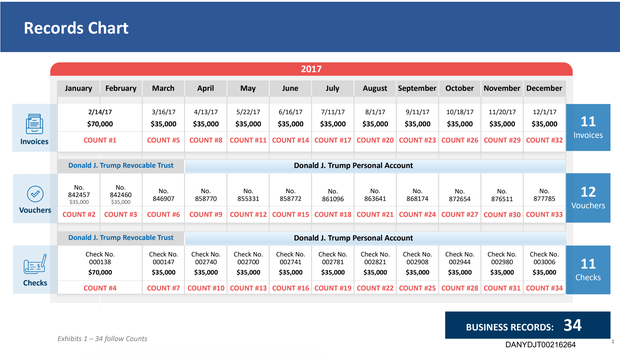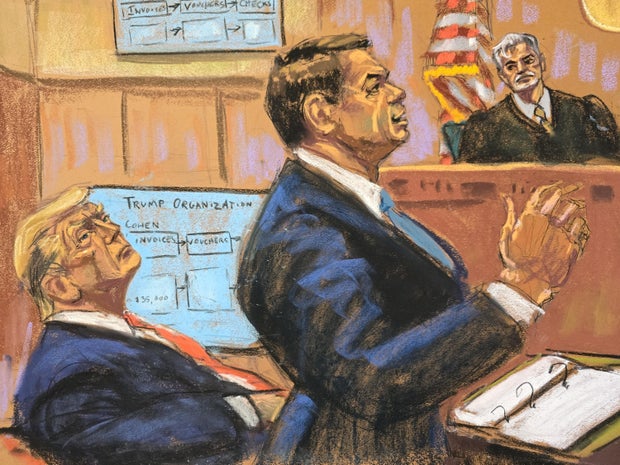CBS News
What was Trump convicted of? Details on the 34 counts and his guilty verdict

Former President Donald Trump’s conviction in New York stemmed from a $130,000 “hush money” payment his attorney Michael Cohen made to adult film star Stormy Daniels in the days before the 2016 election.
Prosecutors said the deal was meant to keep voters in the dark about Daniels’ allegation that she had sex with Trump years earlier, which he denies. But the actual charges that Trump faced were much less salacious, and dealt with the comparatively mundane paperwork that was generated when he reimbursed Cohen for the payment.
Here’s what to know about the charges Trump faced:
What was Trump convicted of?
Trump was charged with 34 counts of falsification of business records in the first degree, which is a felony in New York. He pleaded not guilty when he was arraigned last year.
In 2017, Cohen and Allen Weisselberg, an executive at the Trump Organization, reached an agreement about how Cohen would be repaid for the $130,000 that he sent to Daniels in exchange for her silence. Weisselberg detailed the calculations in handwritten notes that were shown to the jury at trial.
Cohen would receive $130,000 for the Daniels payment, plus $50,000 intended for a technology company that did unrelated work for Trump. That amount was doubled to account for taxes that Cohen would have to pay on the income. Weisselberg then tacked on an extra $60,000 as a bonus for Cohen, who was upset that his regular year-end award had been cut. The total worked out to $420,000.
Manhattan District Attorney’s Office
Cohen would be paid in a series of monthly payments of $35,000 over the course of 2017. The first check was for $70,000, covering two months. Cohen sent an invoice to the Trump Organization for each check, portraying the payment as his “retainer.” Bookkeepers then generated a record for the company’s books, known as a voucher, every time he was paid, with the description “legal expense.” The first three payments were made from Trump’s trust, while the remaining nine came from his personal account.
Each of the 34 charges against Trump corresponded to a check, invoice and voucher generated to reimburse Cohen. The prosecution laid out the charges in a chart that jurors saw several times during the trial:
Manhattan District Attorney’s Office
Prosecutors said Trump knew the payments were to reimburse Cohen for the Daniels payment, not for his legal expenses.
The jury voted to convict him on all 34 counts. As Trump looked on in court on Thursday afternoon, the clerk asked the foreperson of the jury for the verdict on each count.
“How say you to the first count of the indictment, charging Donald J. Trump with the crime of falsifying business records in the first degree, guilty or not guilty?” the clerk asked.
“Guilty,” the foreperson responded, repeating the answer 33 more times.
Why were the charges a felony?
Under New York law, falsification of business records is a crime when the records are altered with an intent to defraud. To be charged as a felony, prosecutors must also show that the offender intended to “commit another crime” or “aid or conceal” another crime when falsifying records.
In Trump’s case, prosecutors said that other crime was a violation of a New York election law that makes it illegal for “any two or more persons” to “conspire to promote or prevent the election of any person to a public office by unlawful means,” as Justice Juan Merchan explained in his instructions to the jury.
What exactly those “unlawful means” were in this case was up to the jury to decide. Prosecutors put forth three areas that they could consider: a violation of federal campaign finance laws, falsification of other business records or a violation of tax laws.
Jurors did not need to agree on what the underlying “unlawful means” were. But they did have to unanimously conclude that Trump caused the business records to be falsified, and that he “did so with intent to defraud that included an intent to commit another crime or to aid or conceal the commission thereof.”
What was Trump’s defense?
Jane Rosenberg
Trump’s lawyers argued that the payments to Cohen were for his work as Trump’s attorney, not reimbursements for the Daniels payment.
The defense argued that the descriptions on the invoices and records were accurate — Cohen held the title “personal attorney to the president” once Trump took office, and was being paid for his legal services under an unwritten retainer agreement. Therefore, their argument went, no business records were falsified.
They also focused much of their firepower on portraying Cohen as a liar, with the goal of discrediting his testimony. Cohen was the only witness who testified that Trump knew about the true purpose of the reimbursements, a crucial pillar of prosecutors’ effort to show Trump’s intent.
Ultimately, the jurors rejected the defense’s arguments and sided with prosecutors in finding Trump guilty.
When will Trump be sentenced?
Shortly after the verdict was handed down, Merchan, the judge, set Trump’s sentencing date for July 11, just days before the start of the Republican National Convention.
Under New York law, each count of falsifying business records in the first degree carries a maximum sentence of four years in prison and a $5,000 fine. But Merchan has broad discretion when it comes to imposing a sentence. Most legal observers expect him to punish Trump with little or no time behind bars, based on factors like Trump’s status as a first-time offender and his age. Merchan could instead rely on options like probation, home confinement or solely a fine.
Trump has vowed to appeal the verdict, and any sentence could be delayed until that process plays out.
CBS News
CNN links disturbing forum posts to North Carolina GOP nominee for governor

Watch CBS News
Be the first to know
Get browser notifications for breaking news, live events, and exclusive reporting.
CBS News
No evidence Biden team replied to Iranian hackers, officials say

Watch CBS News
Be the first to know
Get browser notifications for breaking news, live events, and exclusive reporting.
CBS News
Built-to-rent communities a growing U.S. trend amid sky-high housing costs

As housing costs skyrocket and the demand for affordable homes surges, builders across the U.S. are constructing entire blocks of single-family homes specifically designed for renters. These so-called built-to-rent communities can offer another option for those who want a home but cannot afford to buy one.
Texas resident Richard Belote says his rented home 90 minutes from Houston is a “good stepping stone, because interest rates are “just too high to manage.” Despite saving diligently to buy a home, he and his fiancee feel priced out of their house hunt.
“Just really kind of crossing our fingers that those rates go down,” he said.
Belote is far from alone.
A July CNN poll found 86% of renters say they can’t afford to buy a home and 54% say they believe it’s unlikely they’ll ever be able to. However, another poll found 81% of renters want to own a residence in the future.
“House prices have gone up by more than 40% in just four years,” said CBS News business analyst Jill Schlesinger. “There are a lot of people out there who really, really want to be in homes, and they just can’t afford to get there,” Schlesinger said.
Built-to-rent communities began in Phoenix during the Great Recession to meet that demand. They are higher density and smaller cottage-sized homes — a literal cottage industry now spreading in cities across the Sunbelt, including Phoenix, Atlanta and Dallas.
Brent Long leads the build-to-rent expansion for Christopher Todd Communities in Arizona. He says the renters range in age from Gen Z to Baby Boomers.
“It’s really renters by choice and renters by need,” Long said.
When asked if the concept goes against a more traditional view of buying a home to achieve the American Dream, Long said, “I don’t think it takes it away. It solves some issues that are out there in terms of affordability, availability.”
Cassie Wilson rents by choice in Phoenix, Arizona. She says the “perfect” arrangement allows her to enjoy many amenities without the homeownership responsibilities.
“I can live here in a house that is fully up kept by someone else. I would like to buy a house out here. But on the flip side, I still want to travel,” Wilson said.
Though a growing industry, these built-to-rent communities made up only 7.9% of new residential constructions last year, according to Arbor Realty Trust.
Arizona housing advocates warn that the properties are not enough to push prices down, but welcome anything that helps to address the housing shortage.
Back in Texas, Belote said he wakes up every morning and enjoys his backyard with the dogs and his cup of coffee. It’s a home-sweet-home as he waits for a break in the housing market.






